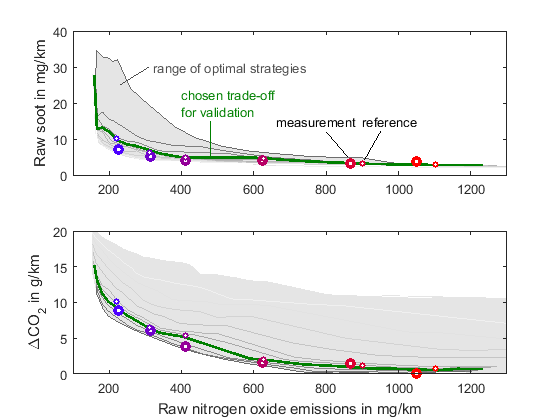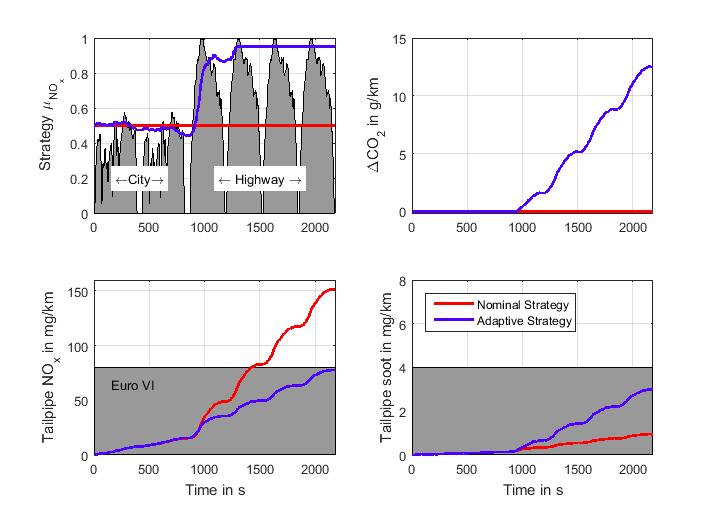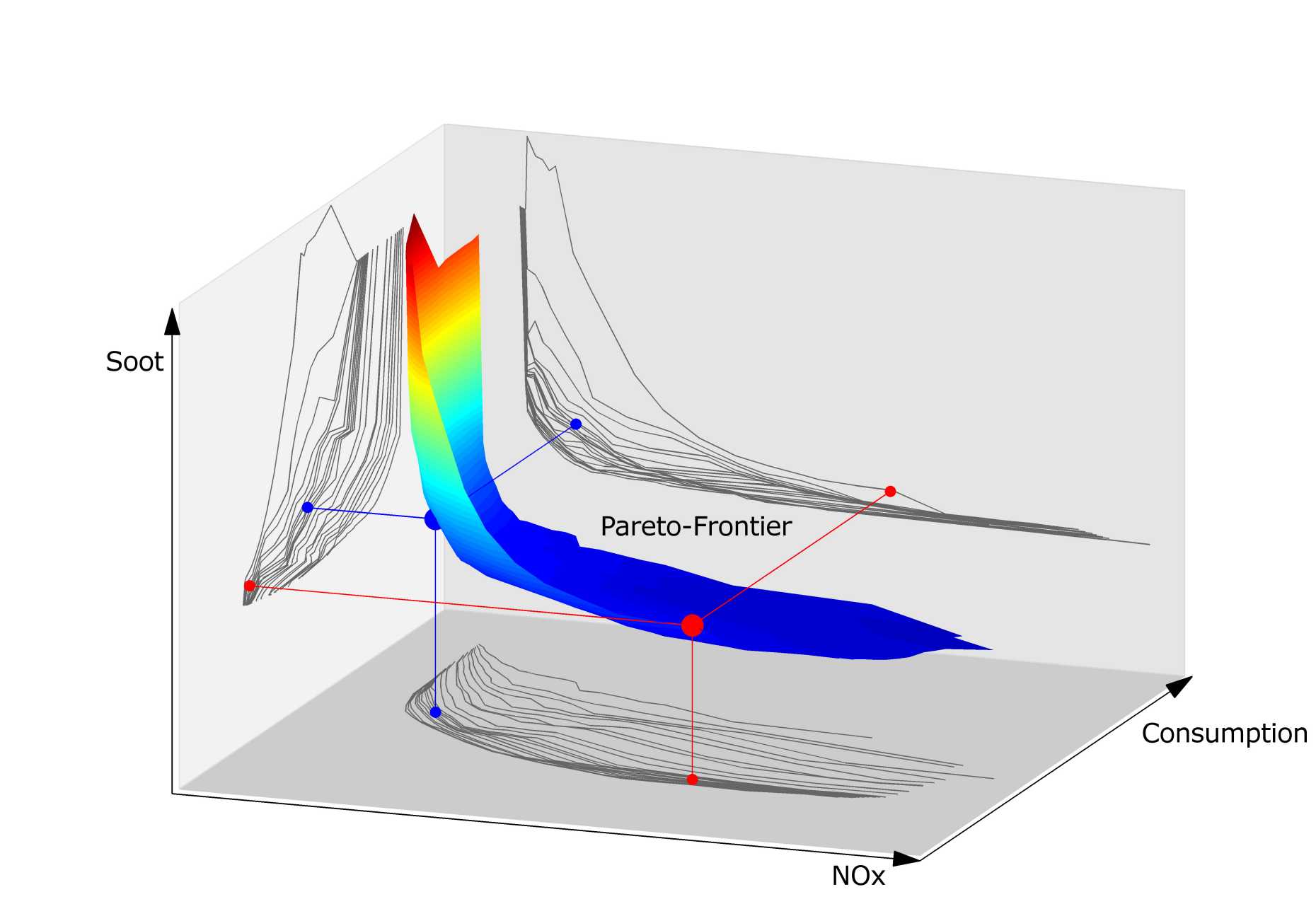Emission-Optimized Diesel Engine
Despite the recent advancements in electric powertrains and renewable propulsion sources, the transportation of goods and the heavy-duty sectors are still heavily dependent on combustion engines. Diesel engines are highly reliant and provide both good energy- and power-density. Due to their lean burning combustion with a high compression ratio, Diesel engines are inherently more fuel-efficient than spark-ignition gasoline engines. This makes them an interesting choice when aiming to minimize CO2-emissions in a variety of applications.
The project "Emission Optimized Diesel Engine", which is a collaboration of the ETH Zurich laboratories LAV and IDSC with the Daimler AG, was sponsored by the Forschungsvereinigung Verbrennungskraftmaschinen e.V. (external page FVV), as well as the Swiss Federal Office for Energy (external page BFE).
The main results of the project have been presented at the FVV Herbsttagung 2015 in Würzburg (see conference proceedings) as well as in an article published by the Motorentechnische Zeitschrift Deutschland in December 2017 (MTZ, see external page online version)
The ever increasing demand on the purity of vehicle exhaust gases has sparked the further development of Diesel engine systems among manufacturers. Most passenger car diesel engines use in-engine measures to minimize pollutant formation, i.e. exhaust gas recirculation and injection timing, as well as a chain of exhaust gas after-treatment systems to clean tailpipe exhaust gases. The minimization of pollutant formation requires the careful tuning of the in-engine actuators, which is a delicate task that is difficult to automate. Currently, manufacturers are required to freeze this in-engine actuation strategy, which means that the raw emission characteristic of the engine cannot be changed, once the engine leaves production.
In this project, we investigate the opportunities offered by a variable in-engine actuation strategy. Such a strategy could be used to influence the raw emission characteristic of the engine during operation. In a real-driving scenario, such as required for the so-called real driving emission (RDE) test, the engine emission characteristic could be adjusted during operation according to the needs of the exhaust gas after-treatment systems. For example, shortly after a cold start, when the after-treatment system is not fully capable yet, the engine could be operated with a low-emission strategy. As soon as the SCR system warms up to its nominal operating temperature and is capable of removing a larger amount of nitrogen oxides from the exhaust gases, the engine could adopt a more fuel efficient mode of combustion. Of course, legislation may have to be adjusted in order to allow for such an integrated emission management, nevertheless, this article aims at investigating the potential benefits.
The figure below shows the Pareto-optimal results, when driving the NEDC using a number of different emission strategy.

Once the engine is calibrated according to the procedure shown above, the newly obtained degree of freedom may be utilized to influence the emission characteristic of the full engine-and-aftertreatment system. The figure below indicates, that in the case where only a nominal operating strategy (red) of the engine is used, the tailpipe emissions are too high when driving on a highway. With the proposed calibration, an adaptive emission controller that adjusts the engine raw-emission characteristic in order to keep track of the emission limits during driving (blue). Such a procedure may be crucial in order to fullfill emission limits not only during governmental test procedures, but also during real driving.

Final Report and Main Article
"Emissionsoptimierter Dieselmotor" Philipp Elbert, Christophe Barro, Alois Amstutz, Christopher Onder, and Konstantinos Boulouchos, Frankfurt: Forschungsvereinigung Verbrennungskraftmaschinen e.V., (2015). Read Article on external page www.themis-wissen.de
"Adaptive Regelung der Real-Driving-Emissionen von Dieselmotoren" Philipp Elbert, Alois Amstutz and Christopher Onder, MTZ Motortechnische Zeitschrift (2017), 78, pp76-83. external page Read Article
Conference Contributions
"Emissionsoptimierter Dieselmotor", Philipp Elbert, Christophe Barro, Alois Amstutz, Christopher Onder, and Konstantinos Boulouchos Informationstagung Motoren, (2015) Frankfurt: Forschungsvereinigung Verbrennungskraftmaschinen e.V. Read Article.
"Diesel Engine Operating Strategies: PM, NOx and CO2; A Three Dimensional Trade-Off, as opposed to a single-pollutant minimization.", Christophe Barro, Philipp Elbert, Panagiotis Kyrtatos, and Konstantinos Boulouchos, 20th ETH Conference on Combustion Generated Nanoparticles, (2016). Read Article.
Peer-Reviewed Journal Contributions:
"The Post Injection: Coalescence of 3D CFD-CMC Simulation, 2D Visualizations in a Constant Volume Chamber and Application in a Modern Passenger Car Diesel Engine." Christophe Barro, Sushant Pandurangi, Philipp Meyer, Konstantinos Boulouchos, Philipp Elbert, and Yuri M. Wright. Read Article.
Press-Release:
"Research for clean Diesel Engines", FVV Press Release, 2016, external page Read Article.
